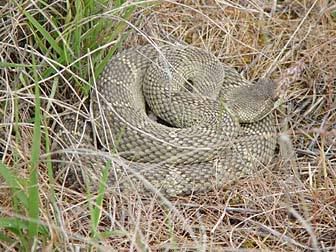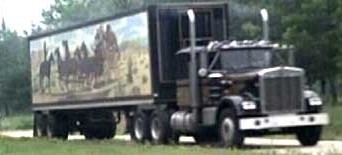|
|
 
Location: Brighton, Colorado | I have lived in Colorado all my life and so has my wife. Between the two of us, she had never seen a rattlesnake and I had only seen a few but this year, we have seen 5 in the last 2 weeks out riding in the foothills.
Does anyone have any information or personal experience on how or what to do with horses if they were to be bitten by one? What to expect?
I am just curious, just incase it were to happen. Its not something that I have ever worried about cause you just rarely see them. |
|
| |
|
Elite Veteran
Posts: 690
    
Location: missouri | They are rarely fatal unless they affect their breathing... ask your vet about a dose of Epinephrine in case of such emergency... you wouldn't want to carry your horse back to camp if it happened out on the trail... Hope none of us ever have to deal with em... |
|
| |
|
Elite Veteran
Posts: 648
  
Location: Coconut Creek, FL | Years ago we had a horse at our barn that had been bitten and he recovered quite nicely. I don't know what kind of snake bit him, but I seem to remember his leg staying a bit swollen in the area. I have heard that most survive, but it depends on where they are bitten and how strong a dose they receive. They are often bitten in the nose and the swelling can block the nasal passages and that would be an extreme emergency. Not something I want to experience, but we come across and occasional water moccasins which can be very agressive. I try to always keep an eye on the ground around the trail, but you just never know. |
|
| |
|
Veteran
Posts: 235
  
Location: Keymar,Maryland | Snake bites are rarely fatal to horses. There will be massive tissue swelling followed by decay. We travel in territory where there are rattlesnakes and copperheads. Other than dead of winter I carry 2 pieces of 1/2" pvc pipe about 6" long with the ends rounded. If necessary they can be inserted into the horses nose to keep his nasal passages open.Remain calm, dismount and walk back to trailer or if possible stay put and have someone bring the trailer to you. If a lower limb and possible apply ice or cold hose if possible. See the vet asap but most of all both you and the horse need to remain calm. Do not tourniquet , cut slits, try to suck venom out or any other measure. If you see the snake try to note what it looks like, depending on species your vet may have antivenom. Call ahead and tell them you are coming, what kind of snake ( if possible), and where bitten. Traumatic but likely you and horse will be OK. BTW, rattlesnakes usually give you warning, making for a great rollback and spin . Rich . Rich |
|
| |
|
 Expert
Posts: 2453
      
Location: Northern Utah | I occassionally see a rattlesnake when riding. Most the time we just pause the horse and let the snake go his way. If the snake curls up an threatens, we just make a wide berth and go by. I seem to see more in the early summer as they emerge from their dens and late summer as the hills dry out and follow their prey near water. I've never had a horse bitten. In fact I don't think we have ever even had one actually strike at a horse. Just give them a little distance and all will be well. |
|
| |
|
 Extreme Veteran
Posts: 385
     
Location: high desert, CA. | I agree with painted horse. We have the most dangerous type of rattlesnake here in the high desert. They are called the "Mojave Green Ratlesnake", and believe me, ole "Crotalus Scutalatus" is someone you avoid!! The poison is both a neurotoxin, AND a hemotoxin. This means they attack both the bloodstream, and destroy the nervous system. The worst place to have your horse bitten would be on the face or nose. If you can get a piece of 1/2 inch water hose or tubing up in the air passages, then keep the breathing steady and anxiety level low, you stand a chance of coming out ok with vet care and antivenin. THIS IS THE CULPRIT!! 
|
|
| |
|
 
Location: Brighton, Colorado | Thanks for everyones input, it is greatly appreciated. |
|
| |
|
 Extreme Veteran
Posts: 455
     
Location: Texas | On the hose for the nasal passages: How far should the hose go up the nostril? Rich M. says he carries 6" long pieces, and another person on here said they carry 10" long pieces and insert 8" up the nostril. Is there a minimum to be effective? I would hate to have 6" and need 10" or have 10" and do some other damage by shoving them up too far. |
|
| |
|
 Expert
Posts: 2453
      
Location: Northern Utah | I've always heard 6 inches on the hose. But I don't carry any with me. I really wonder what kind of problem this is? How many horses get snake bit on the nose while out riding? I sure the heck wouldn't let my horse put his nose down to sniff a rattlesnake. Out loose on the mountain, maybe a horse would sniff a snake on it's own. I know my horses when they hear the buzz of the rattles, they are shying away. If they got bitten on their own, it may be half a day before somebody notices. |
|
| |
|
Regular
Posts: 81
  
| Great advice and hopefully none of us will ever have to use any of it. I was raised in Massasauga Swamp Rattler territory in NE Ohio. When I told my current vet that I carry 1/2" garden hose, his comment was, depending on the size of the horse's head; i.e. long head vs. short head, no more than 8" in the nostril. When I posted on the other thread awhile back, I said 10" based on my big-headed Walker because you need to leave at least two inches OUTSIDE the nostril to pull the hose back out again. And yes one does have to be very careful to not insert too much into the nose cavity, but enough to keep the air passages from swelling shut. The hose can be cut to 10 inches, but depending on the size of the head, any amount over two inches can be left outside the nostrils. I slather the garden hose pieces in vaseline and keep them in a ziplock bag to keep them clean. The vaseline allows them to be quickly inserted without damaging the tissue in the nose. Also be sure when the pieces are cut that the edges are smooth I lived in SoCal for five years and had heard of those evil "Mojave Mombas" . They make sidewinders look like the family pet Even though I now live in timber rattler/cottonmouth/copperhead country, thanks for the picture because I honestly didn't know what they look like |
|
| |
|
 Expert
Posts: 2453
      
Location: Northern Utah | On todays ride we ran into a rattlesnake. Three-four times a summer and today was one of those days. A friend and I took our daughters out for a trail ride. We had five 13-14 year old girls cantering and trotting down the trail all in giggles. My daughter went past the snake not seeing it. The second horse stopped abruptly and shy'd to the left. I suspect my daughter on the 1st horse woke up the snake and it coiled and rattled as the 2nd horse got close. I was at the back of a string of 7 and asked what was wrong, Since I was far enough away not to hear the snake. I told them to just keep the horses back and the snake uncurled and slithered off into the brush when given an opening. |
|
| |
|
 Veteran
Posts: 209
 
Location: pensacola, fl | I had an old App gelding get bitten by a Rattlesnake while grazing in his pasture. The grass was always cut short and no trees or anything for snakes to hide in so it was a shock to me. He was bitten on the cornet band (toward the back) the vet came out and had to cut half of his hoof away, the doctoring on our part was a lot of work, 3X a day we had to soak his foot and leg in epsom salt and pack his wound with a betadine and sugar mixture then place a diaper over the wound and then smear another type of medication over his leg and wrap it in saran wrap to keep the heat in and then wrap with a leg wrap followed by duct tape and then wrestle a rubber boot over his hoof.Then he had to have 3 different antibiotics 2 by mouth which we had to make a paste of and use a syringe to shoot it in his mouth like a wormer and 1 was injectable also had to give him cortisone shots for swelling. It was horrible, we kept that up for about 3 weeks and he was healing nicely. One day after about a week of not having to doctor him I went out to feed and he was laying down, as i got closer I noticed that the wound had burst back open again. I called the vet and she came immediatly, she said that the infection and ventom had settled in the bone and we could try and save him but the chances of saving his leg were minimal, I could tell from looking at my old man that he didn't have the fight left in him so we laid him to rest. If I would have been there when the snake bit him I may have had a better chance of saving him, but the vet said that when these guys are bit there biggest threat is infection not the venom itself. I hope no one else ever has to experience this!!!!!!!!!!
Edited by Monsterhorse 2007-06-11 9:49 AM
|
|
| |
|
 Extreme Veteran
Posts: 455
     
Location: Texas | It is kind of funny this topic came up when it did. On Saturday, while we were riding, a friend's horse was bitten by a rattlesnake. The horse stumbled and shortly afterward, would not walk. She started hyperventilating and after leading her a little further, noticed there was something wrong with one front leg. At first, it appeared to be a bowed tendon. After getting her in the trailer and back to camp, the leg had swollen up to her chest and there were two small razor cuts just above the hoof. The vet confirmed it was a snake bite. She spent the night at the vet, but no anti-venom was deemed necessary by the vet. The prognosis appears to be good. The vet and a couple local ranchers said there has been an abnormally high amount of snake bite cases this spring in western North Dakota. |
|
| |
 Rattle Snakes
Rattle Snakes Rattle Snakes
Rattle Snakes